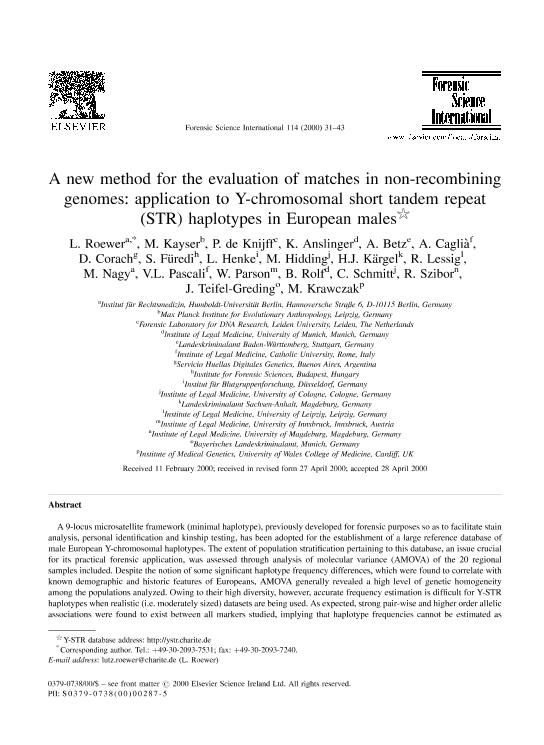Artículo
A new method for the evaluation of matches in non-recombining genomes: Application to Y-chromosomal short tandem repeat (STR) haplotypes in European males
Roewer, L.; Kayser, M.; De Knijff, P.; Anslinger, Katja; Betz, A.; Caglià, A.; Corach, Daniel ; Füredi, S.; Henke, L.; Hidding, M.; Kärgel, H.J.; Lessig, R.; Nagy, M.; Pascali, V. L.; Parson, Walther; Rolf, B.; Schmitt, C.; Szibor, R.; Teifel-Greding, J.; Krawczak, M.
; Füredi, S.; Henke, L.; Hidding, M.; Kärgel, H.J.; Lessig, R.; Nagy, M.; Pascali, V. L.; Parson, Walther; Rolf, B.; Schmitt, C.; Szibor, R.; Teifel-Greding, J.; Krawczak, M.
 ; Füredi, S.; Henke, L.; Hidding, M.; Kärgel, H.J.; Lessig, R.; Nagy, M.; Pascali, V. L.; Parson, Walther; Rolf, B.; Schmitt, C.; Szibor, R.; Teifel-Greding, J.; Krawczak, M.
; Füredi, S.; Henke, L.; Hidding, M.; Kärgel, H.J.; Lessig, R.; Nagy, M.; Pascali, V. L.; Parson, Walther; Rolf, B.; Schmitt, C.; Szibor, R.; Teifel-Greding, J.; Krawczak, M.
Fecha de publicación:
10/2000
Editorial:
Elsevier Ireland
Revista:
Forensic Science International
ISSN:
0379-0738
Idioma:
Inglés
Tipo de recurso:
Artículo publicado
Clasificación temática:
Resumen
A 9-locus microsatellite framework (minimal haplotype), previously developed for forensic purposes so as to facilitate stain analysis, personal identification and kinship testing, has been adopted for the establishment of a large reference database of male European Y-chromosomal haplotypes. The extent of population stratification pertaining to this database, an issue crucial for its practical forensic application, was assessed through analysis of molecular variance (AMOVA) of the 20 regional samples included. Despite the notion of some significant haplotype frequency differences, which were found to correlate with known demographic and historic features of Europeans, AMOVA generally revealed a high level of genetic homogeneity among the populations analyzed. Owing to their high diversity, however, accurate frequency estimation is difficult for Y-STR haplotypes when realistic (i.e. moderately sized) datasets are being used. As expected, strong pair-wise and higher order allelic associations were found to exist between all markers studied, implying that haplotype frequencies cannot be estimated as products of allele frequencies. A new extrapolation method was therefore developed which treats haplotype frequencies as random variables and generates estimates of the underlying distribution functions on the basis of closely related haplotypes. This approach, termed frequency 'surveying', is based upon standard population genetics theory and can in principle be applied to any combination of markers located on the Y-chromosome or in the mitochondrial genome. Application of the method to the quality assured reference Y-STR haplotype database described herein will prove very useful for the evaluation of positive trace-donor matches in forensic casework. (C) 2000 Elsevier Science Ireland Ltd.
Archivos asociados
Licencia
Identificadores
Colecciones
Articulos(OCA HOUSSAY)
Articulos de OFICINA DE COORDINACION ADMINISTRATIVA HOUSSAY
Articulos de OFICINA DE COORDINACION ADMINISTRATIVA HOUSSAY
Citación
Roewer, L.; Kayser, M.; De Knijff, P.; Anslinger, Katja; Betz, A.; et al.; A new method for the evaluation of matches in non-recombining genomes: Application to Y-chromosomal short tandem repeat (STR) haplotypes in European males; Elsevier Ireland; Forensic Science International; 114; 1; 10-2000; 31-43
Compartir
Altmétricas



